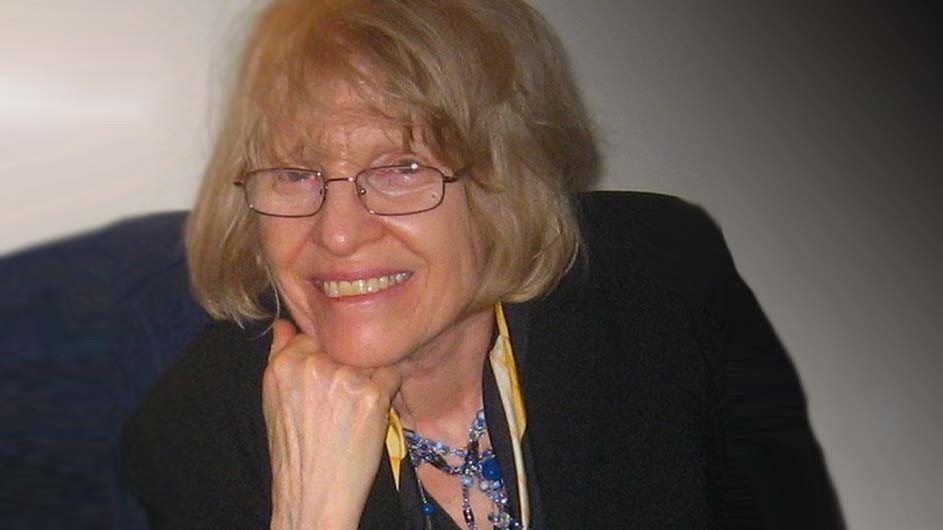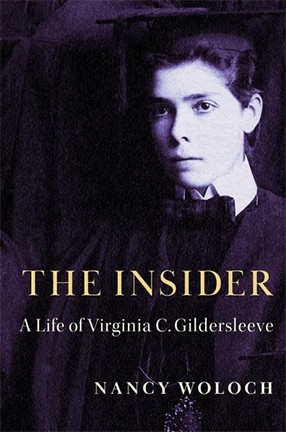A New Biography of Barnard Dean Virginia Gildersleeve Arrives Just in Time for Women’s History Month
The longtime dean was both an insider and an outsider, says historian Nancy Woloch in her new book.

Virginia Gildersleeve was a very influential dean of Barnard College, which she led from 1911 to 1947. An organizer of the Seven College Conference, or “Seven Sisters,” she defended women's intellectual abilities and the value of the liberal arts. She also amassed a strong set of foreign policy credentials and, at the peak of her prominence in 1945, served as the sole woman member of the U.S. delegation to the drafting of the United Nations Charter. But her accomplishments are undercut by other factors: She had a reputation for bias against Jewish applicants for admission to Barnard, and early in the 1930s voiced an indulgent view of the Nazi regime.
In The Insider, Nancy Woloch, a research scholar in the history department at Barnard, explores Gildersleeve’s complicated career in academia and public life. At once a privileged insider, prone to elitism and insularity, and a perpetual outsider to the sexist establishment in whose ranks she sought to ascend, Gildersleeve stands out as richly contradictory.
Woloch discusses the book with Columbia News, as well as what she’s read recently that she recommends (not surprisingly, most of the titles involve academia).
Q. What inspired you to write this book?
A. The life and career of Virginia Gildersleeve have long foiled potential biographers. Gildersleeve is a daunting subject. She craves attention, courts conflict, and at the same time evades scrutiny; she throws up roadblocks and hurdles. But the challenge seemed appealing, and there are rich resources at Barnard and Columbia.
Or to put it another way, I appreciated a topic that involved higher education, liberal arts, the Seven Sisters, college admissions, the women’s movement, local history, internationalism, transatlantic connections, Middle East politics, autobiographical narrative, personal entanglements, volatile situations, rivalry, competition, complexity, and unending controversy.

Q. As a biographer, how do you reconcile the sometimes unattractive qualities of a subject with her accomplishments?
A. I tried to look at each problematic facet of Gildersleeve’s career—and there were quite a few—as an opportunity to explore a contested terrain. For example, her bias against Jewish applicants to Barnard. The terrain there is the swiftly changing world of college admissions, which is in flux more or less continually, and often beset with new predicaments. That said, Gildersleeve could be “mulish” (her word), clueless, reprehensible, or insufferable.
Q. Why did you choose your title, The Insider?
A. Gildersleeve was an “insider” in two ways. First, when the Barnard Board of Trustees and Columbia President Nicholas Murray Butler chose her as dean, she was the only one of many candidates considered who had attended both Barnard (class of 1899) and Columbia (for graduate school), and had also taught at both institutions (she was a Barnard English professor, and she had taught a graduate course at Columbia).
Second, Gildersleeve, as the daughter of a well-known New York judge who was a friend of Columbia’s president, she was part of the social class that ran things in New York City. This counted for a lot in 1911, and it’s crucial throughout my book. But there are instances in which Gildersleeve was as much an outsider as an insider, as at the UN in 1945.
Q. What books have you read recently that you would recommend, and why?
A. Most recently, I’ve read or re-read histories of higher education that pertain directly to my work on Gildersleeve. For Columbia, I recommend Robert McCaughey’s histories of Columbia and Barnard, Stand, Columbia and A College of Her Own; Rosalind Rosenberg’s Changing the Subject, which explores women’s experiences at Columbia; and Michael Rosenthal’s astute biography of Nicholas Murray Butler, Nicholas Miraculous. Butler, I should add, was quite solicitous in his long professional relationship with Gildersleeve; without such solicitude, of course, she would have been forced to seek another occupation.
I have long admired Helen L. Horowitz’s Alma Mater, on women’s colleges, and Campus Life, on the many ways in which students shaped higher education. For fiction on academic life, there’s John Williams’ Stoner, the story of an early 20th-century, Midwestern English professor and the difficulties he encountered.
Q. What are you teaching this semester?
A. Nothing right now, but the courses I taught in the past at Barnard and Columbia were History of Education and seminars in U.S. Women’s History, with a focus on the Progressive era and the 1920s. I’m now revising a survey of U.S. Women’s History that has gone through many editions and may survive yet another.
Check out Books to learn more about publications by Columbia professors.